Statement on border violence and pushbacks at Melilla border
The latest outburst of violence at Melilla again highlights the injustice and violations of human rights taking place at the EU’s external borders

The latest outburst of violence at the Spanish enclave Melilla left dozens of migrants dead and many police officers injured. It once again highlights the injustice and violations of human rights taking place at the EU’s external borders, as well as the absence of safe and regular pathways for migration.
With more droughts and famines on the horizon, a still-active epidemic and conflicts all over the world, this is a very pressing issue. We have to expect the number of refugees and people looking for a brighter future in Europe to increase.
The EU’s asylum and migration policy continue to degenerate into national efforts preventing people from entering the EU and isolating them upon their arrival. The violence at the Melilla enclave and violent returns are yet another evidence of ongoing pushbacks and state violence. T The violence we have witnessed in Melilla had to be expected. It was the result of policies that keep too many people stuck in inhumane conditions for too long against the repeated warnings of human rights organisations.
Besides the violation of the EU law and the fundamental principles of the EU Charter, the EU continues to pursue its containment by suffering policy, as seen in the form of pushbacks at the external borders and the financing of border controls in third countries. This makes the EU vulnerable to blackmail, be it from Libyan warlords or authoritarian regimes in Morocco or Turkey. In order to no longer be susceptible to this kind of blackmail by external actors with more than questionable human rights credentials, we have to build a fair and efficient asylum and migration policy.
Volt immediate demands:
Immediate independent and impartial investigation: Morocco and Spain must be open to an independent investigation to hold those responsible for the loss of life to account and to avoid repetition of such tragedies. The investigation should involve international experts and monitors to enhance impartiality, independence and effectiveness.
Full reparation: The authorities should also provide full reparation for the human rights violations, including for refoulement by arbitrary pushbacks. Measures should also be taken to ensure access to justice for victims and their families.
EU to stand firm against violations and strat infringement procedures, in case of systematic breaches: Stand firm against efforts to undermine the right to seek asylum and safeguards against collective expulsions and unsafe returns.
Volt demands for a fair system:
EU and Member States to establish a credible independent border monitoring mechanism: ensure that the scope of the monitoring applies to all alleged fundamental rights violations during activities on land and at sea. Findings and conclusions of such a mechanism should be publicly available and lead to actual consequences in the event of breaches.
EU and Member States to put fundamental rights at the centre: Ensure that knowledge and respect for fundamental rights are at the centre of the recruitment of staff at EU and national agencies by also providing mandatory fundamental rights training, conducted by an independent third-party, ahead of their deployment.
Put human rights at the forefront of partnerships with third-country cooperation. Ensure that EU funds are not used to support border control and the training of coast guards who breach fundamental rights.
Establish safe and regular pathways to help mitigate the resort to dangerous routes and reduce the risk of loss of life in the future.
Photo Credits: Ggia, CC BY-SA 4.0, via Wikimedia Commons